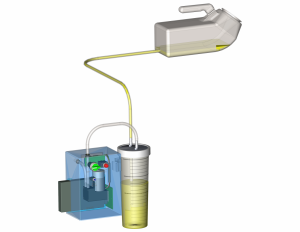Dignity, Quest to Jointly Produce ‘Timo Solution’ to Manage Urinary Incontinence
Written by |

Dignity Medical Solutions and Quest Specialty Products will jointly market the “Timo Solution” – a novel technology to manage urinary incontinence (UI), a condition that frequently affects patients with multiple sclerosis (MS).
Such patients report two main types of UI: urge incontinence, caused by nerve damage in the part of the brain and spinal cord that controls the bladder, and stress incontinence, caused by weak pelvic floor muscles that leads to urine leakage after coughing, laughing or sneezing. UI affects about 20 percent of American men aged 65 or older.
 Timo, which will go on sale later this year, is billed as a safer, healthier and cheaper way to manage UI than urinary catheters, with significantly fewer complications.
Timo, which will go on sale later this year, is billed as a safer, healthier and cheaper way to manage UI than urinary catheters, with significantly fewer complications.
Timo is a plastic handheld urinal attached by tubing to a pump that evacuates urine to a reservoir. Its main component is a small, quiet automated vacuum device attached to a disposable bottle to collect urine.
One of Timo’s advantages is that patients can leave in place for longer periods of time without the risk of overflow or spillage, giving them more autonomy. This reduces the need for diapers, catheterization and hospitalization. In case a hospital stay can’t be avoided, Timo could potentially limit care management costs.
“Bringing Timo to the public has been a longtime dedicated effort for me and my team,” Gary F. Pevnick, Dignity’s founder, said in a press release. “The inventor, a former patient of mine, suffered from multiple sclerosis and the debilitating effect of UI. His dream was to help others who suffered this demeaning disorder. Our partnership with Quest Specialty Products and their expertise will make his dream come to fruition.”
Quest CEO Dan Fitter said his company “is proud to partner” with Dignity on what he called a “highly reliable and mobile urinary transfer system.”
“This exciting new product will help reduce patient risk for urinary tract infections while semi-automating the process of urine transfer away from the patient,” said Fitter. “This lightweight system is designed for simplicity in use by medical staff and caregivers and can be fully operational within minutes.”


